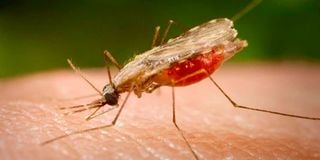New drug to reduce malaria rates among pregnant women with HIV

Anopheles mosquito. It is the main main vector for malaria. Africa bears nearly the entire global burden of malaria, accounting for an estimated 96 per cent of malaria cases and deaths in 2020.
What you need to know:
- One million women living with HIV in sub-Saharan Africa are also infected with malaria during pregnancy every year.
- Every year, nearly 6.7 million clinical cases of malaria are reported in Kenya, with 70 per cent of the population being at risk.
A drug aimed at reducing the risk of malaria infections in pregnant women living with HIV has shown promising results, according to the Kenya Medical Research Institute (Kemri).
According to a recent study published at Lancet, the new drug treatment could help prevent malaria during pregnancy, especially among pregnant women with HIV in Sub-Saharan Africa.
The researchers underscore the potential of integrating an antimalarial drug, dihydroartemisinin-piperaquine, into the already existing malaria treatment.
Malaria poses significant risks to both maternal and newborn health, particularly for pregnant women living with HIV. The World Health Organization (WHO) estimates that one million women living with HIV in sub-Saharan Africa are also infected with malaria during pregnancy every year.
Africa bears nearly the entire global burden of malaria, accounting for an estimated 96 per cent of malaria cases and deaths in 2020. Every year, nearly 6.7 million clinical cases of malaria are reported in Kenya, with 70 per cent of the population being at risk.
WHO advocates the daily administration of co-trimoxazole, an antibiotic, to prevent malaria in pregnant women with HIV in regions characterised by high malaria transmission. However, experts say the efficacy of this co-trimoxazole in sub-Saharan Africa is compromised due to the escalating resistance of malaria parasites to the drug.
But there is good news. Kemri researchers in collaboration with Liverpool School of Tropical Medicine, Malawi’s Kamuzu University of Health Sciences and the Malawi University of Science and Technology conducted a series of trials to explore alternative options to prevent malaria in pregnant women with HIV, which found that out of numerous antimalarials, dihydroartemisinin–piperaquine was the only one tolerated well enough to be considered for malaria prevention. Until now, no suitable alternative or additional preventative treatment has been identified for pregnant women living with HIV.
The researchers conducted a study to evaluate the efficacy of adding monthly dihydroartemisinin–piperaquine to daily co-trimoxazole in preventing malaria infections in women living with HIV, as compared to a control group receiving a monthly placebo alongside daily co-trimoxazole. The trial involved 904 randomly assigned participants.
The trial found that pregnant women who received the combination of monthly dihydroartemisinin–piperaquine to daily co-trimoxazole had 68 per cent less malaria during pregnancy than women who received the standard of care with daily co-trimoxazole alone.
“We celebrate these findings that propose additional arsenal against a disease that risks about 70 per cent of our population. Malaria in pregnancy can cause a host of serious health complications, including miscarriage, stillbirth, pre-term delivery and growth restriction of newborn babies, and co-infection with HIV doubles these risks,” said Kemri CEO Elijah Songok.
Dr Hellen Barsosio, a clinical research scientist from Kemri’s Centre for Global Health Research and lead author in the study, said: “These findings are very encouraging. Not only did we find that adding dihydroartemisinin– piperaquine to co-trimoxazole was safe and prevented two out of every three malaria infections during pregnancy, but it was also well tolerated by pregnant women, which is important when a drug is given for prevention. The study could lead to a much-needed policy change that could make a real difference in improving maternal and newborn health in Africa”.
Dr Simon Kariuki, head of Malaria Program from the KEMRI-CGHR expressed optimism that the outcomes of the study, coupled with a parallel trial underway in Gabon and Mozambique, will contribute valuable insights to shape malaria prevention guidelines issued by the World Health Organization and influence the development of national health policies.





